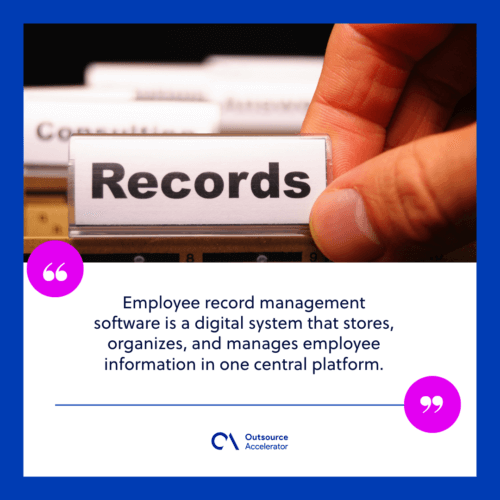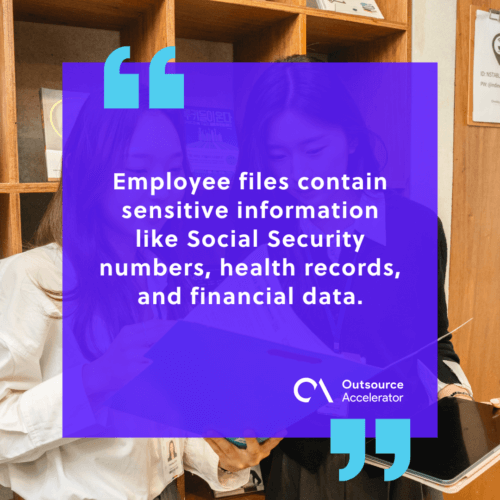Top 10 employee record management software

List of employee record management software
HR teams today deal with more data than ever before. But between compliance requirements, remote workforce demands, and rising employee expectations, keeping track of personnel records remains a priority.
According to Forbes, 70% of HR specialists use three to six apps or software just to complete one job. Why do that when there’s a comprehensive solution: Employee record management software?
These tools centralize everything from contracts and performance reviews to payroll documents and training certifications – all in one secure platform.
In this article, we’ll explain what this software does, why it’s crucial, and which platforms stand out in 2026. If you’re tired of clunky spreadsheets and security risks, read on.
What is employee record management software?
Employee record management software is a digital system that stores, organizes, and manages employee information in one central platform.
It covers a wide range of HR data, including:
- Personal details (name, address, contact info)
- Employment contracts and job history
- Tax forms and payroll data
- Training records and certifications
- Performance reviews
- Time-off balances and attendance

Instead of dealing with spreadsheets, emails, and disorganized folders, businesses use this software to keep their workforce data consistent, compliant, and easy to access.
Most tools are cloud-based, secure, and built to grow with your team. They also help HR departments streamline onboarding, improve collaboration, and reduce manual paperwork.
5 Benefits of using employee record management tools
Adopting employee record management software does more than declutter HR’s desk. Here’s what it can do for your organization:
1. Time savings
Manual HR tasks like updating employee information or filing paperwork waste valuable time. Digital tools automate these tasks, freeing HR teams to focus on higher-value activities.
2. Fewer errors
Data entry mistakes can cost your business in payroll errors, miscommunication, or compliance issues. Employee record management software reduces those risks by standardizing input fields and flagging inconsistencies.
3. Remote accessibility
Cloud-based platforms allow HR teams and employees to access documents from anywhere, which is essential for businesses with hybrid or remote teams.
4. Better collaboration
Need payroll to verify work hours or finance to check salary information? Record systems allow teams to work from the same source of truth while maintaining proper permissions and access levels.
5. Real-time reporting
Most modern tools include dashboards and analytics. With just a few clicks, you can track workforce metrics like turnover rates, employee tenure, and upcoming contract renewals.
Features to look for in employee file management software
Not every platform is built the same. Here are the features that truly matter when choosing employee record management software:
- Secure document storage. Look for tools with data encryption, multi-factor authentication, and detailed user permissions. Make sure they’re compliant with relevant privacy regulations depending on your location and industry.
- Automated workflows. The system should alert you when contracts expire, certifications need renewal, or documents are missing.
- Customizable fields. Every business tracks different data. Make sure your tool lets you customize employee profiles to include things like emergency contacts, training records, or equipment issued.
- Employee self-service portals. Employees should be able to log in, update their information, download tax forms, or submit leave requests without HR’s constant involvement.
- Integration with HR and payroll systems. The software should connect seamlessly with your payroll, benefits, and time-tracking platforms. This ensures accuracy across your systems and avoids duplicate data entry.
- Mobile access. Your HR team doesn’t need to be tethered to their desks. A mobile-friendly interface ensures you can approve changes or access records on the go.
- Scalable pricing. Pick a solution that offers flexible pricing based on the number of users or features, so it grows with your company.
10 best employee record management software
Here are ten top-rated employee record management platforms, each offering unique features to suit different business sizes and needs:
1. BambooHR
Best for: Small to midsize businesses
BambooHR provides a user-friendly interface and comprehensive HR functionality, including employee data management, onboarding workflows, and performance tracking.
Its cloud-based setup allows HR teams to manage personnel records securely and efficiently. The software also includes e-signatures and document storage, making it easier to maintain accurate and up-to-date records.
2. Gusto
Best for: Startups and small businesses
Gusto combines payroll, HR, and benefits in a clean, unified platform. It automates document filing for new hires, stores tax forms, and ensures compliance through built-in alerts.
Small teams benefit from its ease of use and the ability to handle onboarding paperwork digitally.
With integrated payroll and benefits administration, Gusto simplifies processes that often get fragmented across systems.
3. Zoho People
Best for: Custom workflow needs
Zoho People offers highly customizable employee profiles, workflows, and forms, making it an excellent fit for businesses with complex or industry-specific requirements. It supports time tracking, performance management, and document storage within a single platform.
Integration with other Zoho tools and third-party apps provides flexibility for companies already using the Zoho ecosystem.
4. Breathe
Best for: Small businesses in the US and UK
Breathe focuses on simplifying HR processes for small businesses, with tools for managing employee records, absences, and performance. Its secure document storage feature helps keep personnel files organized and compliant.
Users appreciate its intuitive layout and straightforward functionality. It’s particularly well-suited for teams that want to digitize HR processes without dealing with overly complex systems.
5. SAP SuccessFactors
Best for: Global enterprises
SAP SuccessFactors is a full-service HCM suite tailored for large organizations that need robust reporting, global compliance tools, and workforce analytics. It offers advanced document management capabilities, role-based access, and integrations with ERP systems.
This employee record management software handles everything from recruiting to performance reviews, making it a powerful choice for multinationals. Its scalability and depth of features come with a steeper learning curve but deliver strong ROI.
6. Namely
Best for: Mid-sized U.S. businesses
Namely offers a modern interface with modules for employee records, payroll, benefits, and performance reviews. The system is praised for its compliance features and role-specific permissions, ensuring that sensitive data is only accessible to authorized users.
Namely also supports employee self-service, helping reduce administrative overhead. This platform is particularly useful for companies transitioning from manual HR processes to a digital-first strategy.
7. Deputy
Best for: Shift-based and hourly workforces
Deputy is known for its workforce scheduling tools, but it also includes strong employee recordkeeping features. It allows HR managers to link work schedules with employee profiles, helping ensure compliance with labor laws.
Its mobile app gives staff quick access to personal information and time-off balances. This makes it a great fit for retail, hospitality, or healthcare businesses.
8. Rippling
Best for: Fast-growing startups
Rippling automates employee record management, device management, and app provisioning all in one platform. It stands out for its IT-HR integration, allowing new hire documents, software access, and payroll to be set up in under 90 seconds.
The system offers automated compliance tracking and integrates seamlessly with over 500 apps. Rippling is an efficient, modern choice for fast-scaling tech companies.
9. Eddy
Best for: Small local businesses
Eddy is an HR platform tailored to small businesses that want easy-to-use tools without the need for technical expertise. It offers digital document storage, onboarding checklists, and employee profile management.
The system keeps everything organized and accessible, even for companies without a dedicated HR department. Eddy also includes time tracking and PTO management.
10. Paycor
Best for: Compliance-heavy industries
Paycor provides HR, payroll, and employee record management with a strong focus on regulatory compliance. It includes robust reporting features, electronic document signing, and built-in alerts for document expiration or missing files.
Paycor is ideal for healthcare, finance, and education sectors where staying audit-ready is critical. Its scalability makes it suitable for both mid-sized firms and larger enterprises.
Importance of managing employee records
Effectively managing employee records goes beyond simple paperwork. It’s a critical part of running a compliant, secure, and efficient workplace.
Organized records support legal obligations, safeguard sensitive data, prepare your business for audits, and provide valuable insights for HR decision-making.
Legal compliance
Federal and state laws in the U.S. require businesses to maintain certain records for defined periods.
Under the Fair Labor Standards Act (FLSA), employers must keep wage records for at least three years. Failure to comply can result in fines, lawsuits, or penalties from regulatory agencies.
Security and privacy
Employee files contain sensitive information like Social Security numbers, health records, and financial data. A secure digital solution protects this data from unauthorized access or breaches, reducing your risk and building employee trust.

Audit preparedness
You never know when an internal or external audit might happen. Whether it’s from the IRS or a labor board, having quick access to well-organized records can save your company time, money, and stress.
HR decision-making
You can’t make strategic workforce decisions without clear data. A strong record management system helps HR leaders track hiring trends, performance outcomes, and training needs, all in real-time.
Discover digital employee record management solutions
If your team is still working from folders, spreadsheets, or legacy HR systems, you’re wasting time and exposing your business to risk.
Digital employee record management solutions offer a faster, more secure, and more intelligent way to handle your workforce data.
Here’s what you should do next:
- Assess your current process. What’s working, and where are the gaps?
- Make a feature list. What are your must-haves (security, integrations, mobile access)?
- Compare vendors. Use free trials and request demos.
- Involve your team. HR, IT, and finance should all weigh in.
- Plan for training. Roll it out properly so everyone knows how to use the new system.
The result? A leaner, more agile HR department and a better employee experience from day one.







 Independent
Independent




